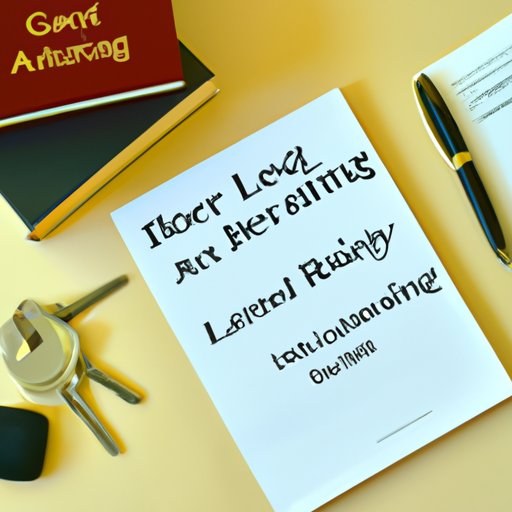
I. Introduction
Real estate agents play a crucial role in the buying, selling, and leasing of properties. They are responsible for guiding clients through the complex process of property transactions, managing negotiations, and ensuring that all legal requirements are met. If you’re interested in pursuing a career in real estate, you may be wondering what it takes to become a licensed agent. In this article, we will explore the qualifications, skills, and tips you need to be a successful real estate agent.
II. Qualifications and Education: The Essential Requirements to Become a Real Estate Agent
To become a real estate agent, you must first meet some basic requirements. These include being at least 18 years old, having a high school diploma or equivalent, and being a legal resident of the state where you plan to work. In addition, you must complete a certain number of hours of education and training before you can apply for a license.
One option is to complete the required education and training through a state-approved real estate school. This can typically be done in-person or online and includes courses on real estate principles, contracts, law, and practice. Another option is to complete the required courses through a college or university that offers a degree or certificate program in real estate.
Continuing education is also important for real estate agents, as laws, regulations, and market trends can change over time. Some states require agents to complete a certain number of hours of continuing education every year to maintain their license.
III. Skills and Traits: What Makes an Effective Real Estate Agent
While education and training are important, they are not the only factors that determine success as a real estate agent. There are also certain skills and traits that are essential for this field. These include:
- People skills: Real estate agents must be skilled in communication, negotiation, and conflict resolution. They must be able to build relationships with clients, understand their needs, and explain complex legal and financial concepts in a way that is easy to understand.
- Attention to detail: Real estate transactions involve a lot of paperwork and legal documents. Agents must be meticulous in reviewing and preparing these documents to ensure that everything is accurate and in compliance with all applicable laws and regulations.
- Time management: Real estate agents often work on tight deadlines and must be able to balance multiple tasks at once. They must be skilled in prioritizing their work, delegating tasks when necessary, and managing their time effectively.
- Marketing skills: Real estate agents must know how to market themselves and their listings effectively. This includes using social media, online platforms, and other marketing strategies to reach potential clients and build their brand.
- Problem-solving: Real estate transactions can be complex, and unexpected issues can arise at any time. Agents must be able to think creatively and find solutions that work for all parties involved in the transaction.
Each of these skills and traits is important in the real estate market. For example, a real estate agent who is skilled in communication can help clients navigate the negotiation process and achieve their desired outcome. An agent who is detail-oriented can ensure that all necessary paperwork is completed correctly and on time, avoiding delays and legal issues.

IV. Getting Started in Real Estate: Steps to Becoming a Licensed Agent
The process of becoming a licensed real estate agent can vary depending on the state in which you plan to work. However, there are some general steps that you can expect to follow:
- Complete pre-licensing education: As mentioned earlier, you will need to complete a certain number of hours of education and training before you can apply for a license. This typically includes courses on real estate principles, contracts, law, and practice.
- Take the real estate exam: Once you have completed the required education, you must take and pass the real estate exam in your state. The exam covers topics such as property ownership, contracts, and financing.
- Apply for a license: After passing the exam, you will need to apply for a real estate license in your state. This typically involves submitting an application, paying a fee, and providing proof of completion of the required education and exam.
- Affiliate with a brokerage: Most states require new agents to work under a licensed brokerage for a certain period of time before they can operate independently. You will need to find a brokerage to affiliate with and begin working under their supervision.
- Complete additional training: Many states require agents to complete a certain number of hours of continuing education every year to maintain their license. You may also choose to pursue additional training or certification in a specific area of real estate, such as property management or commercial real estate.
Throughout this process, it is important to stay organized, diligent, and focused. Keep track of important deadlines and requirements, study regularly for the exam, and seek advice and guidance from experienced agents and mentors whenever possible.
V. Navigating the Real Estate Exam: Tips and Strategies to Pass
Passing the real estate exam can be challenging, but there are some tips and strategies that can help you prepare and succeed:
- Study regularly: Don’t try to cram all of your studying into a few days or weeks before the exam. Instead, set aside regular time each day or week to study, review, and practice.
- Take practice exams: Many real estate schools and programs offer practice exams that are designed to simulate the real thing. Taking these exams can help you get a feel for the types of questions you’ll be asked and identify areas where you need to improve.
- Understand the format: Familiarize yourself with the format of the exam, including the number and types of questions, how much time you’ll have, and what materials you can bring with you.
- Get plenty of rest: Don’t underestimate the importance of getting a good night’s sleep before the exam. Being well-rested and alert can help you focus better and perform at your best.
- Stay calm: On exam day, try to stay calm and focused. Take deep breaths, read each question carefully, and don’t rush through the exam.
VI. Building a Successful Career in Real Estate: Top Mistakes to Avoid
Starting out in real estate can be challenging, and there are some common mistakes that new agents often make. These include:
- Not having a business plan: Real estate is a highly competitive industry, and it’s important to have a clear plan for how you will market yourself, find clients, and build a successful career.
- Not focusing on building relationships: Real estate is a relationship-based business, and building strong relationships with clients, colleagues, and other industry professionals is essential to success.
- Not using technology effectively: In today’s digital age, it’s important to use technology and online tools to market yourself, manage your business, and stay connected with clients.
- Not staying on top of industry trends: Real estate is an ever-changing industry, and it’s important to stay up-to-date on market trends, legal changes, and other developments that may impact your business.
- Not being patient: Building a successful career in real estate takes time and effort. Don’t expect to achieve instant success, and be patient and persistent in pursuing your goals.
By understanding these common mistakes and focusing on best practices for success, you can set yourself up for a long and prosperous career in real estate.
VII. Networking and Marketing: How to Build a Strong Client Base in Real Estate
Networking and marketing are critical components of any successful real estate career. Here are some tips and strategies for building a strong client base:
- Attend industry events: Attend local industry events, such as conferences, trade shows, and other gatherings, to meet other agents and professionals and build your network.
- Host open houses: Hosting open houses can be a great way to generate interest in your listings and meet potential clients in your area.
- Use social media effectively: Social media platforms such as Facebook, Instagram, and Twitter can be powerful marketing tools for real estate agents. Use these platforms to showcase your listings and engage with clients and prospects.
- Create a website: Establishing an online presence is essential for any modern real estate agent. Create a professional and informative website that showcases your brand and services.
- Maintain your relationships: Once you’ve built strong relationships with clients and other industry professionals, be sure to maintain those relationships by keeping in touch regularly and providing value whenever possible.
VIII. Conclusion
Becoming a licensed real estate agent requires hard work, dedication, and a commitment to ongoing learning and development. By meeting the basic requirements, developing essential skills and traits, and following best practices for success, you can build a long and prosperous career in this exciting and rewarding field. For more information and resources on pursuing a career in real estate, contact your local real estate association or school.




